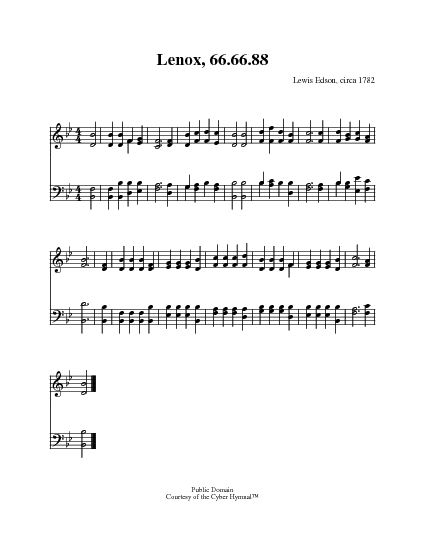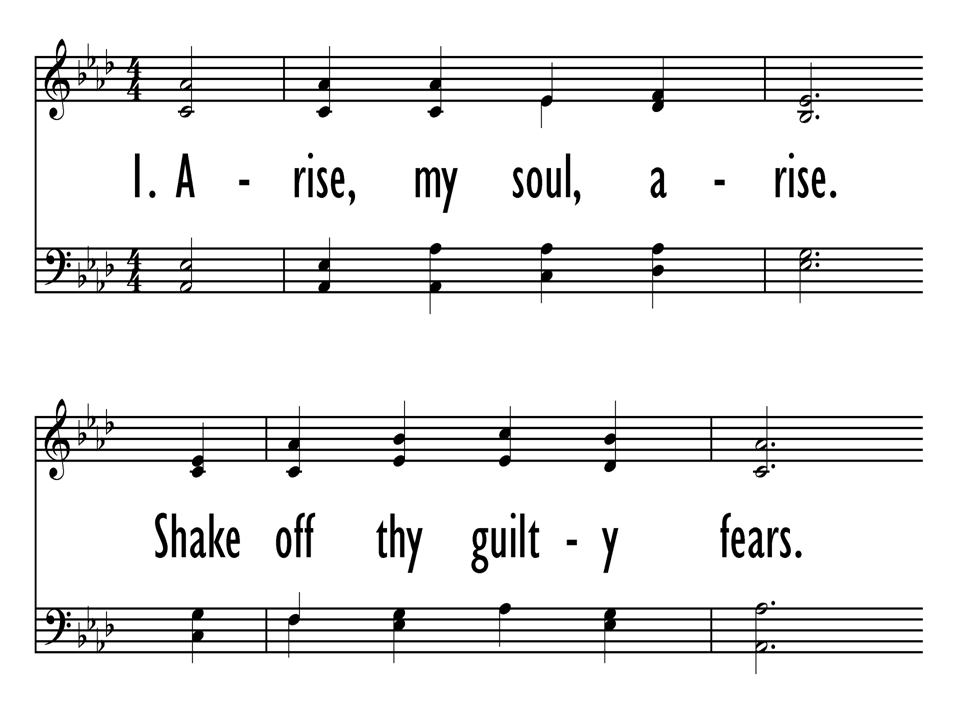- |
User Links
Arise, My Soul, Arise

Arise, my soul, arise, Shake off thy guilty fears
Author: Charles Wesley (1742)Tune: LENOX (Edson)
Published in 893 hymnals
Printable scores: PDF, MusicXMLAudio files: MIDI
Representative Text
1. Arise, my soul, arise,
Shake off thy guilty fears;
The bleeding sacrifice
In my behalf appears;
Before the throne my surety stands;
My name is written on his hands.
2. He ever lives above
For me to intercede;
His all-redeeming love
His precious blood to plead;
His blood atoned for all our race
And sprinkles now the throne of grace.
3. Five bleeding wounds he bears,
Received on Calvary;
They pour effectual prayers,
They strongly speak for me;
Forgive him, oh forgive, they cry,
Nor let that ransomed sinner die.
4. The Father hears him pray,
His dear Anointed One;
He cannot turn away
The presence of his Son;
His Spirit answers to the blood
And tells me I am born of God.
5. My God is reconciled,
His pard’ning voice I hear;
He owns me for his child;
I can no longer fear;
With confidence I now draw nigh,
And Father, Abba Father, cry!
Source: Hymns and Devotions for Daily Worship #299b
Author: Charles Wesley
 Charles Wesley, M.A. was the great hymn-writer of the Wesley family, perhaps, taking quantity and quality into consideration, the great hymn-writer of all ages. Charles Wesley was the youngest son and 18th child of Samuel and Susanna Wesley, and was born at Epworth Rectory, Dec. 18, 1707. In 1716 he went to Westminster School, being provided with a home and board by his elder brother Samuel, then usher at the school, until 1721, when he was elected King's Scholar, and as such received his board and education free. In 1726 Charles Wesley was elected to a Westminster studentship at Christ Church, Oxford, where he took his degree in 1729, and became a college tutor. In the early part of the same year his religious impressions were much deepene… Go to person page >
Charles Wesley, M.A. was the great hymn-writer of the Wesley family, perhaps, taking quantity and quality into consideration, the great hymn-writer of all ages. Charles Wesley was the youngest son and 18th child of Samuel and Susanna Wesley, and was born at Epworth Rectory, Dec. 18, 1707. In 1716 he went to Westminster School, being provided with a home and board by his elder brother Samuel, then usher at the school, until 1721, when he was elected King's Scholar, and as such received his board and education free. In 1726 Charles Wesley was elected to a Westminster studentship at Christ Church, Oxford, where he took his degree in 1729, and became a college tutor. In the early part of the same year his religious impressions were much deepene… Go to person page >Text Information
| First Line: | Arise, my soul, arise, Shake off thy guilty fears |
| Title: | Arise, My Soul, Arise |
| Author: | Charles Wesley (1742) |
| Meter: | 6.6.6.6.8.8 |
| Language: | English |
| Copyright: | Public Domain |
- Year C, Ordinary Time, Proper 28 (33)
Relates to Hebrews 10
Arise, my soul, arise, Shake off, &c. C. Wesley. [Christ the Mediator.] First published in Hymns & Sacred Poems, 1742, p. 264, in 5 stanzas of 6 lines and entitled "Behold the Man." (Poetical Works, 1868-72, vol. ii. p. 323.) In 1780 it was included in the Wesleyan Hymn Book. as No. 194 in an unaltered form, and has been repeated in all subsequent editions (ed. 1875, No. 202). From the Wesleyan Hymn Book it has passed into all the collections of the Methodist bodies in all English-speaking countries, and also into many hymnals outside of Methodism both in Great Britain and America. It has also been rendered into various languages. One in Latin, by the Rev. B. Bingham:—"Surge, surge, Mens mea," is given in his Hymnologia Christiana Latina, 1871. Mr. Stevenson has collected in his Methodist Hymn Book Notes, 1883, numerous illustrations of the direct value which this hymn has been to many.
-- John Julian, Dictionary of Hymnology (1907)
Notes
Arise, my soul, arise, Shake off, &c. C. Wesley. [Christ the Mediator.] First published in Hymns & Sacred Poems, 1742, p. 264, in 5 stanzas of 6 lines and entitled "Behold the Man." (Poetical Works, 1868-72, vol. ii. p. 323.) In 1780 it was included in the Wesleyan Hymn Book. as No. 194 in an unaltered form, and has been repeated in all subsequent editions (ed. 1875, No. 202). From the Wesleyan Hymn Book it has passed into all the collections of the Methodist bodies in all English-speaking countries, and also into many hymnals outside of Methodism both in Great Britain and America. It has also been rendered into various languages. One in Latin, by the Rev. B. Bingham:—"Surge, surge, Mens mea," is given in his Hymnologia Christiana Latina, 1871. Mr. Stevenson has collected in his Methodist Hymn Book Notes, 1883, numerous illustrations of the direct value which this hymn has been to many.
-- John Julian, Dictionary of Hymnology (1907)


 My Starred Hymns
My Starred Hymns





